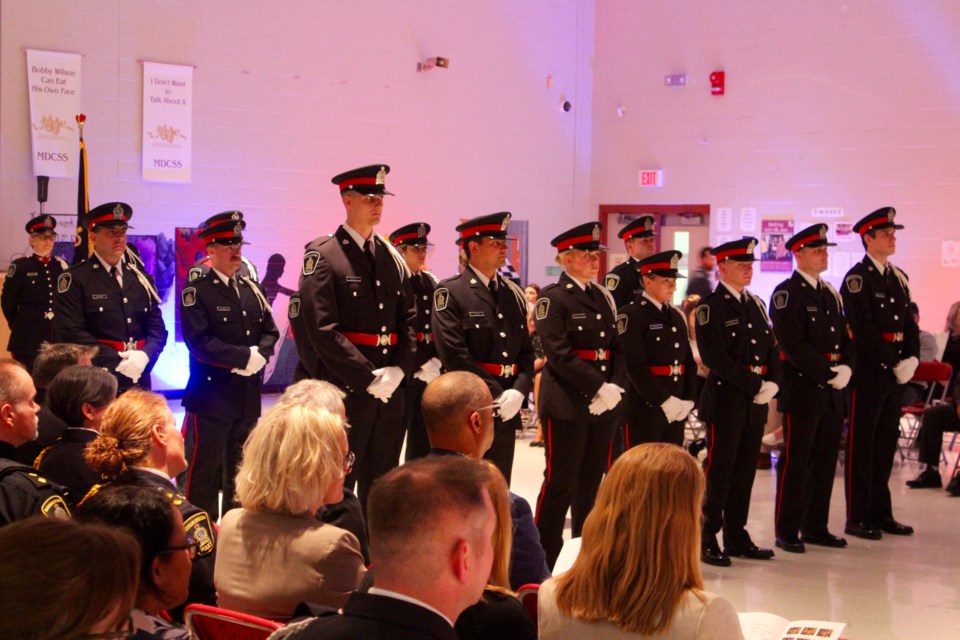The Waterloo Regional Police Service introduced 13 new officers at a badging ceremony at Monsignor Doyle Catholic Secondary School in Cambridge on Thursday afternoon.
Eight officers who recently completed their basic training at the Ontario Police College were sworn in, with five experienced officers receiving their WRPS badges.
"As we celebrate 50 years of policing excellence in Waterloo Region, we're honoured to welcome eight new constables and five experienced officers into our organization," Chief of Police Mark Crowell said in a release.
"We're truly grateful for the calibre of talent and professionalism each of these officers bring to Waterloo Region and we look forward to celebrating with their families, loved ones and the community."
Staffing at the WRPS has been under the microscope in recent months, with the service's $214 million budget being approved by regional council after extensive conversations surrounding an $18 million increase to allow the service to hire 19 additional officers.
A report done by consultant KPMG made recruiting recommendations, with a summary being given to regional council during those discussions. The full report was released after the budget had been approved.
The report stated the WRPS had an average surplus of $3.3 million from 2019-2021 related to staffing costs. The savings came primarily from officers on leave and delays in recruiting new staff.
The service's staffing levels didn't increase materially from 2016 to 2021, despite both population and crime rates increasing, the report stated.
Although WRPS was successful in obtaining funding for 35 additional officers in 2022, it was unable to recruit, train and on-board the first of those officers until late in the year.
The report continued to suggest the service should "consider implementing an Active Staffing Model to replace capacity loss associated with officers on leave."
The funds related to the surplus, it said, could help pay for the additional officers if it was not already being reinvested to other priorities within the service.
Some regional council members believe the report should have been released in its entirety for review ahead of budget approvals, but Crowell remains adamant providing a summary was not done to mislead council in its decision making in regards to the use of any surpluses and the recommendation was to use the funds to address absenteeism and officers on leave, not yearly additional officers.
To help ease recruitment across the province, the provincial government recently rolled out several new initiatives.
Among them, the province will now cover tuition fees for the Basic Constable Training program at the Ontario Police College, which is currently $15,000 per cadet.
The Ontario Police College will also be increasing cohort sizes by 70, from 480 to 550, while expanding the number of cohorts per year from three to four beginning in 2024.
Additionally, officers will no longer need a post-secondary education.
Staff sergeant Matt Halliday, who's been a part of a recruiting outreach project for the WRPS, says police training is extensive and doesn't stop now for the new constables.
"Once they've completed their training with the training branch they're going to be on the road with a field development officer for 46 shifts," Halliday said.
"That includes a list of calls they'll go to with a lot of different experiences and coaching. There's a lot of training that goes into these recruits. It's essentially a year of training before they're on their own."
Halliday, a 19 year veteran of the WRPS, believes the training has changed for the better since he went through the process.
"I think we've identified the more training and education, and further development we have, the better we can go out and police the community," he said.
"Our recruits will also do time with our community engagement and well being office. That really wasn't part of our training."
The officers receiving their badges on Thursday afternoon bring a wide range of experience to the job, including by-law enforcement, special constable services, security, policing in Brazil, corrections, the military and over 43 years of combined policing experience.

